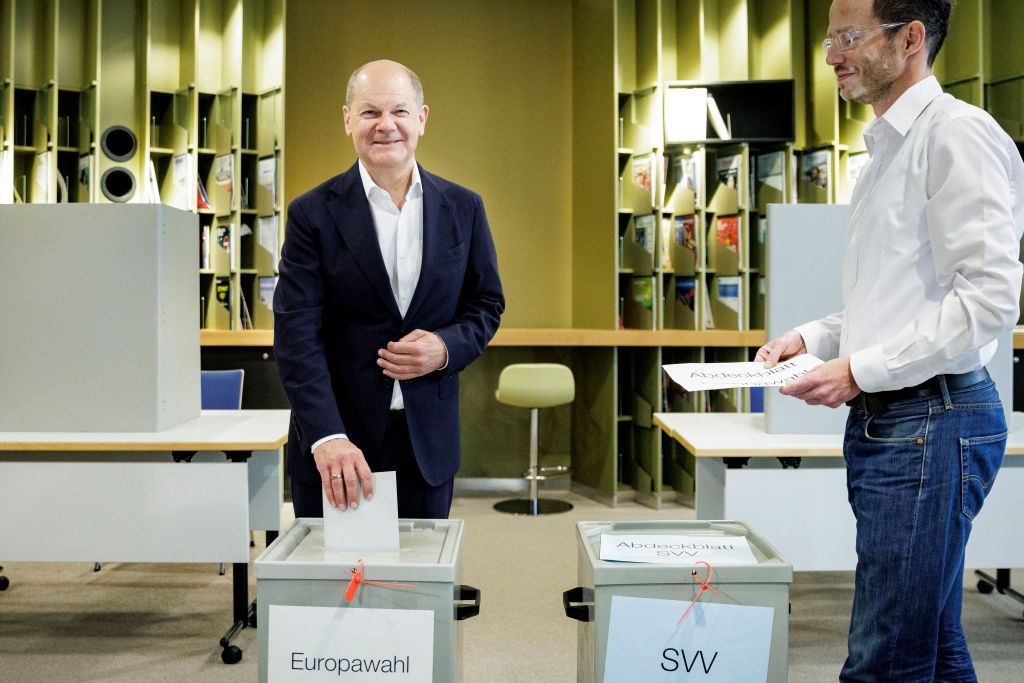European elections 2024: A night of drama as EU moves to right

EU Parliament Shifts Right In Dramatic Night
A picture can speak a thousand words. Sometimes, images can convey a message better than words. They can show the raw emotions of people and the beauty of the world. Getty Images is a famous image source that provides high-quality photos for commercial use. With over 200 million assets, it has one of the largest collections of images, videos, and music. Whether you're creating a presentation, designing a website, or producing a film, Getty Images has everything you need to make your project stand out. So, why not let the pictures tell the story?

The leader of Germany, Olaf Scholz, participates in the voting process for both the European and local elections.
Many people have been talking about French President Emmanuel Macron's sudden decision to call for an election following the success of the far-right National Rally. However, political parties from other EU countries have also been evaluating their results from the election.
Even though there have been increases in far-right and nationalist parties, the centre-right has also done well. They have managed to maintain their position as the largest group and have even managed to acquire more seats.
Political parties with a center-right ideology achieved electoral victories in Germany, Greece, Poland, and Spain, and achieved noteworthy progress in Hungary.
We have compiled some important points from our reporters located throughout Europe.
"Coalition In Germany: Losses But No Snap Election"
Recently, Damien McGuinness was in Berlin. He wrote an interesting blog about his experiences in the city. His article was full of fascinating insights into the culture and history of the German capital. Damien's blog is definitely worth reading if you are planning a trip to Berlin.
The three-party coalition government of Germany has been in a bad state, but unlike Emmanuel Macron, Chancellor Olaf Scholz won't ask for a new election.
The coalition between the Social Democrats, Greens, and Liberals was already challenging. However, with Russia's aggression against Ukraine, they faced the difficult decision of severing economic and energy connections with Russia and abandoning their prior anti-war sentiments.
This caused a separation from a few central supporters, formed differences within the party, and essentially unsettled citizens. A considerable increase in immigration has additionally burdened the assets of regional authorities.
Even though the government has succeeded in increasing its budget for military expenses and shifting its focus from less expensive Russian energy, this indicates that there is a shortage of funds.
Enter the populist political groups located at the far ends of the political spectrum, who claim to have the solutions for a swift return to stability and economic growth. For example, the Alternative for Germany (AfD) party on the far-right advocates for negotiating with Putin and resuming purchases of Russian gas as a solution.
The CDU party secured the lead position with a remarkable 30% of the total votes. The AfD party landed in second place by obtaining 15.9%, followed by the social democratic SPD under Scholz, which earned 13.9% and finished third.
The newly formed populist party BSW, which is led by the former communist Sahra Wagenknecht, strongly advocates for putting an end to the ongoing war. Their proposed solution involves ending the shipment of arms to Ukraine and halting the influx of migrants.
A large number of German citizens and lawmakers think that managing relations with Moscow and the situation of migration is not easy, and most people in Germany are in favor of helping Ukraine.
During moments of doubt and instability, straightforward statements can be very appealing.
Italian PM's Strategic Move Won The Vote!
The origin of the photo is Getty Images.
Before the elections, individuals who back Brothers of Italy are enthusiastically waving their flags to show support.
Laura Gozzi traveled to Rome for her holiday. She had a wonderful time exploring the beautiful city. While she was there, she took many photos of the famous landmarks like the Colosseum and the Vatican City. She also enjoyed trying the local cuisine, such as pizza and pasta, and drinking Italian coffee. Overall, Laura had an amazing experience in Rome and will always remember her trip.
Giorgia Meloni, the current leader of Italy, has solidified her hold on the political landscape of Italy.
She leveraged the European elections to enhance her personal fame by positioning her name as the first choice on her party's ballot, and it turned out to be a shrewd bet: she has managed to augment the amount of votes her party garnered in the 2022 national elections, reaching 29%.
However, Italy's political landscape has witnessed another positive outcome. The Democratic Party, an opposition party situated in the centre-left, achieved better than anticipated in the recent elections. Securing 24% of the votes, it recorded its distinguished accomplishment since 2014.
The outcome will enhance the PD and provide authenticity to its leader, Elly Schlein, who appears to have achieved stability in her position as head of the main opposing party in the country, within a little more than one year.
The minor factions in the ruling coalition now face some decision-making. Forza Italia, which was established by the deceased media mogul Silvio Berlusconi, garnered a slightly greater number of votes than the League party, led by Matteo Salvini, that was previously dominant but is now struggling.
The creator of the League, Umberto Bossi, announced that he will cast his ballot for Forza Italia as a sign of his dissatisfaction with the League's path. Two parties with centrist ideologies, including one led by previous Prime Minister Matteo Renzi, didn't achieve the necessary votes to send representatives to the European Parliament.
However, even though there are internal events happening, Italy has surprisingly remained a relatively stable nation following the European elections. This stability is much greater than that of some of its neighboring countries.
Dutch Green-left And Far-right Make Gains
The blog post includes content that can be found in Getty Images.
Geert Wilders met up with his trusted partner, Marine Le Pen, back in November 2013.
reporting Anna Holligan is currently providing coverage in The Hague.
In the previous November, Geert Wilders, the leader of the anti-immigrant Freedom Party (PVV), who has been a partner of Marine Le Pen for a long time, achieved an unexpected triumph in the Netherlands' general election.
According to the forecasts for the EU election, it seems like the opinion of the people hasn't really altered since that time.
The title reads: Parties on the Green-Left spectrum won the majority of the seats, while the Freedom Party experienced the highest increase in its number of seats.
The subtleties: Political parties with a centre-right ideology performed remarkably well.
According to Frans Timmermans, a seasoned politician from the Netherlands and the European Union, it is evident that a larger percentage of the Netherlands' populace strives for an enhanced Europe, and not its downfall.
Geert Wilders, who had previously pledged to hold a referendum on Nexit, which is Netherlands' departure from the European Union, has recently added five red love heart emojis to a post on X. He also mentioned that his party had gained five more seats, still making them the biggest winners.
Surprisingly, the most significant festivities that I observed at the parliamentary pub last evening were organized by two inexperienced individuals, who held opposing views on political matters.
The members of the pro-EU Volt party, who previously had no representation but now have two MEPs, celebrated happily while standing underneath an arch adorned with balloons in shades of blue and yellow.
Caroline van der Plas, the well-known leader of the Farmer Citizen Movement, was outside the rotating doors, enjoying some fresh air with Jessika van Leeuwen, the party's recently elected MEP.
At first, both political parties were expected to secure two seats in the European Parliament. Nevertheless, the most current forecast indicates that BBB might only obtain one.
New Opposition Emerges In Hungary
Nick Thorpe is currently in Budapest.
Viktor Orban's Fidesz political party emerged victorious in both the European and municipal polls held in Hungary.
The true winner of the evening was Peter Magyar, a 43-year-old attorney who led the center-right Tisza party, which took the place of the previous opposition.
In the recent European Parliament elections, Fidesz attained 44% and Tisza received 30% of the votes despite being established only three months ago. Fidesz will have 11 Members of European Parliament while Tisza will have 7. Tisza seeks to be part of the European People's Party bloc in the European Parliament.
"We have emerged victorious over both the former and current opposition," said Viktor Orban to his followers.
However, in reality, the political structure he constructed, wherein Fidesz functions as a "core force" that other small, feeble parties must operate within, is no longer effective.
Austrian Far-right Party Heralds 'new Era'
The image used is from Getty Images.
Herbert Kickl addresses his followers during the last campaign gathering.
Bethany Bell is currently in Vienna, Austria. She is a journalist and is known for her coverage of European news. Vienna is the capital city of Austria and is well-known for its stunning architecture and rich history. Bethany's visit to Vienna may be related to her work as a journalist, as she will likely be gathering information and conducting interviews. Additionally, she may have some free time to explore the city's many attractions, including museums, restaurants, and famous landmarks like St. Stephen's Cathedral. Overall, Bethany's visit to Vienna promises to be an exciting and informative experience.
Herbert Kickl, the head of the FPÖ, expressed to an enthusiastic group of followers that the outcome of the European elections symbolizes "a fresh start in politics".
He then mentioned that the following stage would involve heading towards the chancellery.
In the coming fall season, Austria is scheduled to conduct parliamentary elections. The previous leaders of FPÖ, namely Hans Christian Strache and Jörg Haider, didn't achieve victory for their party in the last two elections. However, the current party members feel positive about their chances.
In an article written for the politically left-leaning newspaper, Der Standard, the chief editor, Gerold Riedmann, expressed his belief that the FPÖ party has evolved into a collection of individuals who possess various concerns. These might range from apprehensions about immigration, a nuanced view of Putin's politics, feelings of shame regarding vaccinations and COVID-19, doubts about ecological conservation efforts, or a desire to simply impart a lesson to others.
After counting the majority of votes, FPÖ emerged as the winner with 25.7%, closely followed by the conservative People's Party, which garnered 24.7%. The Social Democrats obtained 23.3%, while the Greens and the liberal Neos received 10.9% and 10.1% respectively.













































